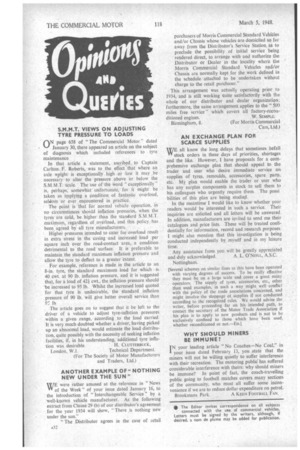S.M.M.T. VIEWS ON ADJUSTING TYRE PRESSURE TO LOADS
Page 34

If you've noticed an error in this article please click here to report it so we can fix it.
nN page 658 of "The Commercial Motor" dated January 30, there appeared an article on the subject of diagnosis which included references. to . tyre maintenance In that article a statement, ascribed to Captain Carlton F. Roberts, was to the effect that where an axle weight is exceptionally . high or •low it may he necessary to alter the pressure above or below the S.M.M.T. scale. The use of'the Word " exceptionally " is, perhaps, somewhat • iinfOrtunate, for it might be taken as implying a condition of fantastic overload, seldom or ever encountered. in practice.
The point is that for normal vehicle operation, in no circumstances should inflation pressures, when the tyres are cold, be higher than the standard S.M.M.T. .maximum, 'regardless of overload, and this policy has been agreed by all tyre manufacturers.. . . Higher pressures intended to cater for overload result in extra stress in the casing and increased load per square inch over the road-contact area, a condition detrimental to the road surface. It is preferable to maintain the standard maximum inflation pressure and allow the tyre to deflect to a greater extent.
For example, reference is made in the article to an 8-in. tyre, the standard maximum load for which is 40 cwt. at 90 lb. inflation pressure, and it is suggested that, for a load of 42i cwt., the inflation pressure should be increased to 95 lb. Whilst the increased load quoted for that tyre is undesirable, the standard inflation pressure of 90 lb. will give better overall service than 95 lb . The article goes on to suggest that it be left to the driver of a vehicle to adjust tyre-inflation pressures within a given range, according to the load carried. It is very much doubted whether a driver, having picked up an abnormal load, would estimate the load distribution, quite possibly with the necessity of seeking inflation facilities, if, in his understanding, additional tyre infla
tion was desirable. H. CLUTTERBUCK,
London, W.I. Technical Department. (For The Society of Motor Manufacturers and Traders, Ltd.) .
ANOTHER EXAMPLE OF" NOTHING NEW UNDER THE SUN"
WE were rather amused at the reference in "News " of the Week" of your issue dated January 16, to the introduction of "interchangeable Service" by a well-known vehicle manufacturer. As the following extract from Clause 29 (b) of our distributor's agreement for the year 1934 will show, "There is nothing new under the sun,"
"The Distributor agrees in the case of ietail purchasers of Morris Commercial Standard Vehicles and/or Chassis whose vehicles are domiciled so far away from the Distributor's Service Station, as to preclude the possibility of initial service being rendered direct, to arrange with and authorize the Distributor or Dealer in the locality where the Morris Commercial Standard Vehicles and/or Chassis are normally kept for the work defined in the schedule attached to be undertaken without charge to the retail purchaser."
This arrangement was actually operating prior to 1934, and is still wcuking quite satisfactorily with the whole of our distributor and dealer organization; furthermore, the same arrangement applies to the " 500 miles free service" which covers all factory-recon
ditioned engines. W. SEMPLE.
Birmingham, 8. (For Morris Commercial Cars, Ltd.) AN EXCHANGE PLAN FOR SCARCE SUPPLIES
WE all know the long delays that sometimes befall " stock orders in these days of priorities, shortages and the like. However, I have proposals for a comprehensive exchange plan that should appeal to the trader and user who desire immediate service on supplies of tyres, remoulds, accessories, spare parts, etc. my plan would enable the trader or user who has any surplus components in stock to sell them to his colleagues who urgently require them The possi bilities of this plan are being studied.
In the meantime I would like to know whether your readers would be interested in such a service. Their inquiries are solicited and all letters will be answered. In addition, manufacturers are invited to send me their catalogues and price lists. These will be treated confidentially for information, record and research purposes. I might also mention that this investigation is being conducted independently by myself and in my leisure time.
Any assistance from you will be greatly appreciated and duly acknowledged. A. L, O'NEILL, A.S.C. Nottingham.
[Several schemes on similar lines to this have been operated with varying degrees of success. To be really effective they must be on a large scale and cover a great many. operators. The supply of tyres, accessories, etc., other than used examples, in such a way might well conflict with the policy of the trade associations concerned, and might involve the stoppage ot supplies if not conducted according to the recognized rules. We would advise the writer, before proceeding far on his intended path, to contact the secretary of the Motor Trade Association if his plan is to apply to new products and is not to be exclusively confined to those which have been used, whether reconditioned or not.—En.]
WHY SHOULD MINERS BE IMMUNE?
I N your leading article "No Coaches—No Coal," in your issue dated February 13, you state that the miners will not be willing quietly to suffer interference with their recreation, The motoring public' has suffered considerable interference with theirs: why should miners be immune? In point of fact, the coach-travelling public going to football matches covers many sections of the community, who must all suffer some inconvenience if we are to reduce dollar expenditure on petrol.
• Brookmans Park. A KEEN FOOTBALL FAN.
• The Editor invites correspondence on all subjects connected with the use of commercial vehicles. Letters must be signed by the writers, although, if desired, a nom de plume may be added for publication.


















































































